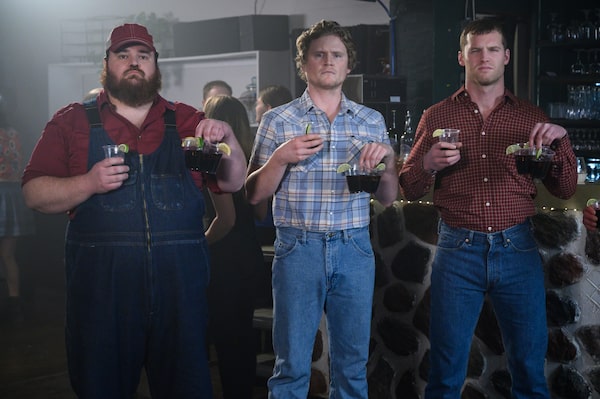
K. Trevor Wilson, Nathan Dales and Jared Keeso in Letterkenny. Season 11 streams on Crave from Dec. 25.AMANDA MATLOVICH/Bell Media via The Canadian Press
At this time of the year, there’s a lot of talk and discussion about comfort. Well, to each his or her own.
Now, I was asked to write about comfort TV and I say, no, I will not write about it in any conventional way. Comfort is as various as people. Or countries. Knock yourself out with your notions of comfort, or nostalgia, while Russia is pounding the heck out of Ukraine’s infrastructure and people there are left for hours daily with no heat, no power, no WiFi. Think you’ve had a hard year? Think about living in Kyiv right now.
By the way, Ukraine’s Culture Minister, Oleksandr Tkachenko, is asking you to boycott Tchaikovsky, for a while, if his music is on your comfort list. “We’re not talking about cancelling Tchaikovsky, but rather about pausing performances of his works until Russia ceases its bloody invasion,” the man says. Fair point.
Listen, I have no issue with comfort entertainment, be it in movies, TV or whatever you’re having yourself. But I will tell you this in a final column – most everything is about love. There is love that is empathy and understanding, love that is tender, quiet or unspoken. But everything that matters is about that. What comforts you, what entrances you, and me too, is about love of people or ideals.

Emily in Paris streams on Netflix from Dec. 21.STEPHANIE BRANCHU/Netflix
If you want a list to distract you, I will definitely watch the new season of Emily in Paris (streams Netflix from Dec. 21), though less for the escapisms of the setting and the clothes than for its bitingly caustic take on the American figure at its centre, Emily (Lily Collins) and her breezy insulting of other people, countries and their cultures. She wants love, but where is it, can it be found via this narcissism she embodies?
What’s truly comforting about TV is that it can provoke you, it can shock you and make you think about how you live. Or love. Even true-crime dramas got up as star-studded tales of murder can make you think beyond the allure of voyeurism.
The baroque miniseries Candy (streams Disney+) is about the tale of the real Candy Montgomery (Jessica Biel), a suburban Texas homemaker who in 1980 was charged with the murder of neighbour Betty Gore (Melanie Lynskey). While you can enjoy the elaborately accurate depiction of late-seventies hair, clothes and home furnishings, you are made to feel very uneasy. That’s because you realize what’s really happening is that all the men in the story – from husbands to cops – don’t understand women at all. Yep, there’s consolation in recognizing that a lurid tale is a cautionary warning about your smug assumptions. You think you know and love someone? Think again. Candy, for all its luridness, is really about second-wave feminism.

Jessica Biel in Candy, streaming on Disney+.Courtesy of Disney+
And then there is love of place and people. To what do we show fidelity? Home. Letterkenny (streams Crave from Dec. 25) is about Canada in a way that’s hard to explain, but beautiful to watch. Sum it up as this: “The residents of Letterkenny belong to one of three groups: the Hicks, the Skids, and the Hockey Players … and constantly feuding over seemingly trivial matters …” Yeah, that’s us. Our conflicts are more notional than real, our grudges more genial than genuinely disturbing.
Now into its 11th season, Letterkenny is heartwarmingly weird. Canada is where it’s emphatically set and what it’s about, and the texture of it all. It embraces Canada with love and affection and a healthy dose of humour.
Of course, a case can be made for the pleasures of comfort television. You know, escapism and warm-and-fuzzy shows that take people away from a bruising political discourse, COVID worries and awareness of wars and destruction. Often such shows are overpraised because they offer contentment.
But we have to be realistic, too. One strange result of the COVID era is that it seems to have brought on a plague of bad acting. The recently released Three Pines (streams Amazon Prime) is well-meaning and, one supposes, a comforting, traditional mystery series. But the acting is often so wretched you can picture an assistant director on-set, holding a large sign in front of an actor that reads, “Make sad face now.” Comfort TV should not disappoint in the details. Mind you, that could be the critic in me, just looking for total excellence.
It’s all up to you. Your need for some sort of escapism is not begrudged. Love whatever you want to enjoy. To me, it seems capricious to entirely avoid bleakness. Television always offers insights into the currency of thought and the mood of a particular time. Sometimes it’s an accurate hint of an underlying mood, be it anger, rage or a loving inclination toward inclusiveness. In the end, comfort comes from knowing how lucky we are, to be free to love our comforts.
This is my last column, on retirement. Thank you for reading and thanks for the feedback and support. Remember to be kind to each other.